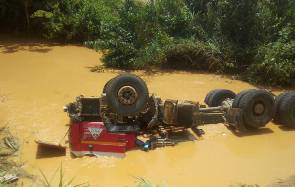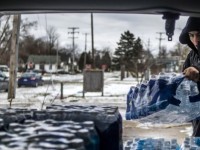 About 60 per cent of Ghana’s water bodies are polluted, with many in critical condition, the Water Resources Commission (WRC) has said.
About 60 per cent of Ghana’s water bodies are polluted, with many in critical condition, the Water Resources Commission (WRC) has said.
Mr. Ben Ampomah, Executive Secretary of the Commission at a workshop in Ho, said the polluted water bodies were mostly in the south-western parts of the country, where illegal mining activities (galamsey) were widespread.
He was addressing a consultative workshop on “Dam safety regulation and Buffer Zone policy” which attracted Coordinating Directors from District Assemblies and other stakeholders in the Region.
Mr. Ampomah said apart from illegal mining, industrial waste, household disposals and farming, were the major causes of water pollution in the country, and thus charged traditional and local government authorities to help protect water bodies.
He commended the Ministry of Lands and Natural Resources for the campaign against illegal mining and called for a concerted effort to sustain the campaign to improve the quality of water bodies in those areas.
Mr Ampomah said water bodies in the Volta Region were fairly good, but urged the Assemblies to protect buffer zones and desist from rezoning them for fuel stations.
“We must know that there is no waste land. Wetlands and buffer zones are well-designated areas. They protect river banks, prevent floods and help improve the quality of rivers and streams. Our Assemblies must therefore incorporate buffer zones into local land use plans,” he stated.
Mr Ampomah, therefore encouraged them, (Assemblies) to demolish structures located on waterways and buffer zones to prevent perennial floods with their related health challenges.
He was hopeful that the Buffer Zone Legislative Instrument and the Legislative Instrument on Dam Safety would help protect water bodies and regulate activities of dam owners and operators.





